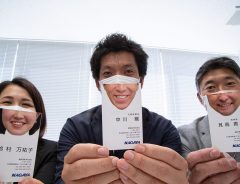- Tags:
- care worker / disabled / elderly care / pandemic / SDGs / welfare worker
Related Article
-

All-organic and plant-based delicatessen Glean by OneBite opens in Shibuya
-

Muji releases new lineup of easy to prepare meals to curve food waste
-

Japanese printing company’s witty business cards reveal the smile behind your mask
-

Japan’s first high-rise condo to use 100% renewable energy to be completed in 2024
-

Vtuber Linca Tojou launches crowdfunding campaign to support Matsudo City, Chiba Pref.
-

Ecolean releases stylish and lightweight drink packs teaming up with iconic anime Neon Genesis Evangelion



Since February 2020, Japan, like much of the world, has been dealing with the novel coronavirus pandemic. As of March 2021, people are still being urged to telework and refrain from unnecessary activities outside of their house in order to prevent infection.
However, there are some industries where people have to go out due to their work, and telework may not be possible for some of them. One such group is care workers who help the elderly and the disabled.
About the "Care for Care Workers" Project
These frontline workers provide an essential service but unfortunately, they often neglect their own care. Some of them say that they have rough skin due to stress, or that they are getting tired.
The Care for Care Workers project was established to listen to the concerns and understand the difficulties of such care workers, as well as to connect care and welfare workers with individuals and companies who want to lend a helping hand.
© Care for Care Workers Project Executive Committee
The chart above indicates how care and welfare workers (both companies providing such services and individual workers) have concerns or pains which need to be solved and how supporters (individuals and companies) can offer services and products in response.
On their website, they have things like coupons for cosmetics, housekeeping services, vouchers for hotel accommodations (for future use), as well as health supplements for both adults and children, with more products and services expected to be added.
© Care for Care Workers Project Executive Committee
More than 50,000 relief supplies are expected to be delivered to caregivers and nursing homes.
© Care for Care Workers Project Executive Committee
To benefit from the service, you must be a person engaged in elderly care or welfare for the disabled, or work for an elderly care or welfare provider for the disabled in Japan.
To support the project, individuals and companies are invited to participate in their ongoing crowdfunding campaign.
The care workers who continue to work and support residents of Japan during the pandemic obviously deserve support and this project offers a good way to enable this.
Care for Care Workers Project